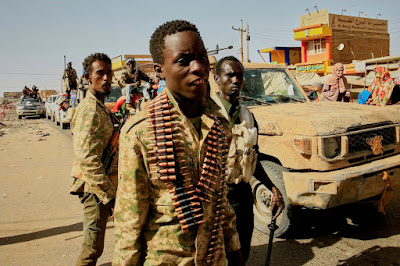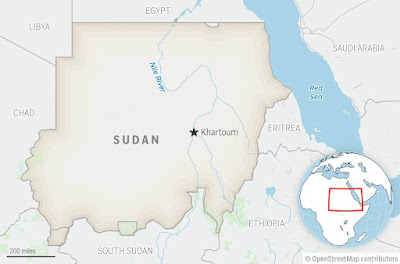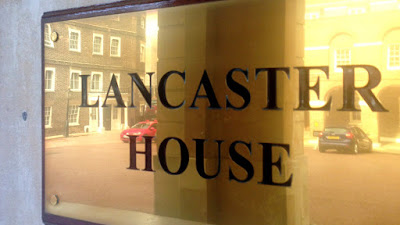From UN Security Council
Sudan: Closed Consultations*
On Monday afternoon (16 June), Security Council members will convene for closed consultations on Sudan. Denmark, Slovenia, and the UK (the penholder on the file) requested the meeting to receive an update on the humanitarian situation in the country. Assistant Secretary-General for Humanitarian Affairs Joyce Msuya is the anticipated briefer.*
More than two years since fighting erupted on 15 April 2023 between the Sudanese Armed Forces (SAF) and the Rapid Support Forces (RSF), the violence has evolved into a protracted armed conflict, resulting in widespread civilian casualties, mass displacement, the destruction of critical infrastructure, severe food and water shortages, and severe violations of international humanitarian law. The humanitarian situation continues to deteriorate amid ongoing hostilities and the growing use of advanced weaponry, including long-range drones, which has further intensified the scale and complexity of the conflict.
Monday’s meeting takes place against the backdrop of escalating attacks on civilians, civilian infrastructure, humanitarian personnel, and aid facilities. According to the Office for the Coordination of Humanitarian Affairs (OCHA), since the beginning of this year, attacks on critical infrastructure such as power stations, water sub-stations, and oil refineries across the country have caused widespread electricity outages and severely disrupted access to essential rights and services, including safe drinking water, healthcare and food supplies. In early May, the RSF reportedly launched a series of drone strikes targeting key civilian and military infrastructure in Port Sudan—the country’s de facto administrative capital—and Kassala, cities which had until then remained largely insulated from the conflict. In mid-May, RSF drone strikes reportedly hit three power stations in the city of Omdurman, causing widespread electricity outages across Khartoum state. (For background and more information, see the brief on Sudan in our June 2025 Monthly Forecast and 18 May What’s in Blue story.)
The security situation in El Fasher and the wider North Darfur region remains highly volatile. In mid-April, the RSF intensified its siege and attacks on the city through shelling, drone strikes, and ground operations, resulting in hundreds of civilian casualties, the killing of aid workers, and mass displacement. According to the UN, on 29 May, a World Food Programme (WFP) facility in El Fasher reportedly came under repeated shelling by the RSF, causing significant damage to a critical humanitarian hub. On 2 June, a humanitarian aid convoy comprising 15 trucks from the WFP and UNICEF came under attack in Al Koma, which is located approximately 80 kilometres from El Fasher. The attack resulted in the deaths of five personnel, injured several others, and destroyed multiple trucks and critical humanitarian supplies. A 3 June joint WFP/UNICEF press statement said that the aid convoy’s route had been shared in advance and that all parties on the ground had been informed of the convoy’s location. The statement called for an immediate investigation and for those responsible to be held accountable. At the time of writing, it is unclear who is responsible for the attack, for which the warring parties have blamed each other. On Monday, Msuya and some Council members might underscore the need to ensure accountability for such attacks and break the cycle of impunity.
Elsewhere in Sudan, hostilities have intensified in the Kordofan region, with the parties reportedly exchanging heavy drone and artillery fire on multiple fronts, causing significant harm to civilians. On 30 May, the Eldaman International Hospital in El Obeid, the capital of North Kordofan state, was reportedly struck in a drone attack by the RSF, killing at least six health workers and injuring more than 15 others. In recent days, airstrikes have also reportedly targeted residential areas of El Obeid city, resulting in the injury of civilians.
At Monday’s meeting, Msuya is likely to describe how the conflict dynamics are impacting the humanitarian situation in the country, particularly in areas experiencing intense fighting. He may provide an update on efforts by the UN and its partners to respond to the unfolding crisis and highlight the persistent impediments to humanitarian access in regions where needs are rapidly escalating. According to OCHA’s latest humanitarian access snapshot, which was published on 4 June, access across Sudan remains severely constrained due to ongoing insecurity, bureaucratic obstacles, and mass displacement, particularly in South and West Kordofan and North Darfur states. In the Kordofan region, heavy fighting has blocked key humanitarian routes and disrupted supply chains, while shifting front lines and long distances from key logistics hubs, such as Port Sudan and the Adré crossing at the Chad-Sudan border, have severely hampered operations. Meanwhile, access in Khartoum remained challenging due to insecurity and bureaucratic restrictions, such as delays in processing travel permits and visas for aid workers.
As hostilities persist, Sudan’s health crisis has deepened, with the healthcare system collapsing, particularly in conflict-affected areas. Since the conflict erupted in April 2023, the World Health Organization (WHO) has verified 156 attacks on healthcare facilities, resulting in 318 deaths and 273 injuries. Meanwhile, approximately 20.3 million people—over 40 percent of the country’s population—are in urgent need of health assistance, with more than two-thirds of Sudan’s states battling three or more disease outbreaks simultaneously.
The cholera outbreak that started in July 2024 has since spread to 92 localities across 13 of Sudan’s 18 states, infecting 74,000 people and causing 1,826 deaths. Since May, the WHO has reported a rapid increase in cholera cases in Khartoum state, with over 16,000 cases and 239 deaths documented. The WHO attributed the recent surge in cholera cases to poor water, sanitation and hygiene, caused by a shortage of safe water following attacks on major power plants and water sources. Estimates suggest that approximately $40 million is needed to rehabilitate water infrastructure in Khartoum state. (For more information, see our 12 March What’s in Blue story.)
According to the International Organization for Migration (IOM), as at 28 May, there were approximately 10.1 million internally displaced persons (IDPs) in Sudan, a decrease of 13 percent compared to the country’s highest-ever recorded population of IDPs early this year. The IOM attributed this reduction to increased return movements, particularly to Khartoum, Sennar, and Al Jazirah states. Since April 2023, more than four million people have sought refuge in Sudan’s neighbouring countries. Returnees continue to face critical humanitarian needs, with limited access to basic services and persistent protection risks. For instance, recent media reports have indicated the presence of landmines and unexploded ordnance in areas of return.
In a 10 June statement following his visit to Khartoum, the WFP’s Sudan representative, Laurent Bukera, announced that the WFP has re-established its presence in the area with the opening of an office in Omdurman. He noted that, with people returning to conflict-affected areas like Khartoum, pressure on overstretched resources will intensify. He underlined the urgent need to restore basic services and accelerate recovery through coordinated efforts with local authorities, national non-governmental organisations (NGOs), UN agencies, and humanitarian partners.
On Monday, Msuya is likely to underscore the urgent need to act to alleviate the suffering of millions in Sudan. He may call on the international community to scale up its humanitarian response to match the scale and urgency of the crisis. He might also underline the need for enhanced and flexible funding for the humanitarian response in Sudan and highlight the urgent need for full, rapid, and sustained humanitarian access. At the time of writing, Sudan’s 2025 Humanitarian Response Plan (HRP), requiring $4.16 billion, was only approximately 14percent funded.
Council members may reiterate key points from their press statement, agreed earlier this evening (12 June), which was authored by the UK. The statement recalled resolution 2736 of 13 June 2024, which demanded that the RSF halt the siege of El Fasher and called for an immediate halt to the fighting and for de-escalation in and around El Fasher. In their statement, Council members condemned the 2 June attack on the WFP/UNICEF humanitarian convoy and the 29 May shelling by the RSF that damaged a WFP facility in El Fasher. They also expressed deep concern over the impact of the conflict on humanitarian operations, including reports of air attacks by the RSF in Port Sudan, Kassala and Khartoum. The statement reiterated that deliberate attacks against humanitarian personnel, their premises, and assets may constitute war crimes and called on the parties to abide by their commitments under the 11 May 2023 Jeddah Declaration as well as by their obligations under international law.
________________________________________________________________
**Post-script (13 June, 3:45 pm EST): After the publication of this story, the meeting was pushed from Friday (13 June) to Monday (16 June), due to the scheduling of an emergency meeting on Iran on Friday afternoon. The story was amended to reflect the change in timing as well as the briefer; while Under-Secretary-General for Humanitarian Affairs Tom Fletcher was expected to brief on Friday, the briefer expected for Monday is Assistant Secretary-General for Humanitarian Affairs Joyce Msuya.
View original: https://www.securitycouncilreport.org/whatsinblue/2025/06/sudan-closed-consultations-7.php
________________________________________________________________
NOTE from Sudan Watch Editor
Plumpy’Nut - A ready-to-use therapeutic food (RUTF)
A peanut product called Plumpy’Nut could come to the aid of starving people, especially children, across the globe.
Severe acute malnutrition has traditionally been treated with therapeutic milk and required hospitalisation. Unlike milk, Plumpy’Nut can be administered at home and without medical supervision.
Plumpy’Nut has a two-year shelf life and requires no water, preparation, or refrigeration. Its ease of use has made mass treatment of malnutrition in famine situations more efficient than in the past.
Image: Plumpy'Nut, a ready-to-use therapeutic food (RUTF)
Read more at Wikipedia: https://en.wikipedia.org/wiki/Plumpy%27nut
End


.jpeg)






